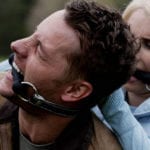 History
History  History
History  Health
Health 10 Everyday Activities That Secretly Alter Consciousness
 History
History Top 10 Historical Disasters Caused by Someone Calling in Sick
 Animals
Animals 10 New Shark Secrets That Recently Dropped
 Movies and TV
Movies and TV 10 Forgotten Realities of Early Live Television Broadcasts
 Technology
Technology 10 Stopgap Technologies That Became Industry Standards
 Weird Stuff
Weird Stuff 10 Wild Facts About Taxidermy That You Probably Didn’t Know
 Travel
Travel 10 Beautiful Travel Destinations (That Will Kill You)
 Miscellaneous
Miscellaneous 10 Modern Marriage Rituals Born from Corporate Branding
 Weird Stuff
Weird Stuff Ten Bizarre Visions of 2026 from Fiction
 History
History 10 “Modern” Problems with Surprising Historical Analogs
 Health
Health 10 Everyday Activities That Secretly Alter Consciousness
 History
History Top 10 Historical Disasters Caused by Someone Calling in Sick
Who's Behind Listverse?

Jamie Frater
Head Editor
Jamie founded Listverse due to an insatiable desire to share fascinating, obscure, and bizarre facts. He has been a guest speaker on numerous national radio and television stations and is a five time published author.
More About Us Animals
Animals 10 New Shark Secrets That Recently Dropped
 Movies and TV
Movies and TV 10 Forgotten Realities of Early Live Television Broadcasts
 Technology
Technology 10 Stopgap Technologies That Became Industry Standards
 Weird Stuff
Weird Stuff 10 Wild Facts About Taxidermy That You Probably Didn’t Know
 Travel
Travel 10 Beautiful Travel Destinations (That Will Kill You)
 Miscellaneous
Miscellaneous 10 Modern Marriage Rituals Born from Corporate Branding
 Weird Stuff
Weird Stuff Ten Bizarre Visions of 2026 from Fiction
Top 10 Deaths Caused by Birds
Are you someone who considers birds a great pet, with a bevy of cockatoos or parrots sitting peacefully in their cages? Or have you had another experience, like a chicken pecking at you as you collect eggs? Regardless of your experience, we have Alfred Hitchcock to thank for creating a fear of what many consider a harmless creature in The Birds. After watching it, you will likely form another opinion of ravens and seagulls.
Interestingly, a flock of crows is called a “murder,” but crows are not the birds to be afraid of. Deaths caused by birds are rare, but they do happen and can be really freaky! Here are ten such killings caused—directly or indirectly—by our feathered… friends.
Related: 10 Terrifying Tales Of When Squirrels Attack
10 Washington Man Killed by Ostrich
Ostriches have the “head in the sand” reputation of being cowardly, preferring to run from threats. But when threatened or cornered, the powerful bird can be dangerous and will attack.
In June 1999, Linda Carter was shocked to discover her father, 81-year-old Fred Parker, lying dead in an ostrich pen on her exotic animal farm near Seattle, Washington. Parker, who was afraid of ostriches according to his family, was living in a recreational vehicle on Carter’s farm. While alone one weekend, he took responsibility for feeding his daughter’s ostriches, emus, llamas, and pot-bellied pigs.
Carter explained that the ostriches were supposed to be fed by throwing food over the fence and was unable to explain why her father had entered King Tut’s pen. The 400-pound bird stomped or kicked Parker and broke the man’s neck. It’s thought that Parker’s bad heart may have contributed to his death as well.
One year earlier, King Tut kicked Carter, sending her flying more than 3 meters (10 feet). She defends the bird and maintains her booming business of selling ostrich meat and skin. “I have no intentions right now of destroying my ostrich because of my father’s death,” she said. “The ostrich was protecting his domain. It’s just like any wild animal. You don’t go in a bear’s pen; you don’t go in an ostrich’s pen.”[1]
9 Ethiopian Child Killed by Martial Eagle
A town in the Somali region of Ethiopia was under attack… by a terrifying martial eagle. Residents of the area believed all of the repeating attacks came from the same bird.
In September 2019, at least three children were pecked or clawed by the vicious bird. One woman was in her house when she heard her son screaming. “We rushed outside the house. I saw [the bird] holding my son on the ground and biting him,” she told the BBC. “He was crying ‘Mother… Mother!’ I ran to him and threw a stick at the bird.”
The action likely saved the boy’s life because another child was not so lucky—he was clawed to death. Armed with shoot-to-kill orders, police began actively hunting the vicious eagle. Authorities believe that the rogue eagle mistook children for its usual prey.[2]
8 Hominid Child Killed by Crowned Hawk-Eagle
The Taung child, unearthed in South Africa in 1924, is a hominid skull believed to be 2 million years old. It was long thought that the 3- or 4-year-old was killed by a leopard or a saber-toothed tiger.
But in January 2006, Johannesburg paleoanthropologist Lee Berger asserted that the Taung child had been scooped up by a large bird of prey that ripped out and ate the child’s eyes. The murderous bird was likely a crowned hawk-eagle, which still today preys on small primates in Africa.
The Taung child’s skull revealed bone damage that distinguishes bird-of-prey kills from those of big cats. “These critical clues were puncture marks in the base of the eye sockets of primates, made when the eagles ripped the eyes out of the dead monkeys with their sharp talons and beaks,” Berger said. “It was a marker that others hadn’t noted before, that linked eagles definitively to the kill.” The marks on the Taung child were perfect examples of eagle damage.[3]
7 Australian Woman Killed by Chicken
An unnamed 76-year-old woman was gathering eggs from her rural Australian property in August 2019 when she was pecked to death by a rooster. The bird’s beak punctured a varicose vein, which hemorrhaged and caused the woman to collapse. She died from blood loss before paramedics arrived. In addition to her varicose veins, the victim had also been diagnosed with hypertension and Type II diabetes.
“Even relatively small domestic animals may be able to inflict lethal injuries in individuals if there are specific vascular vulnerabilities present,” read a report in the Journal of Forensic Science, Medicine, and Pathology, adding that the freak incident shows how vulnerable the elderly are.[4]
6 Australian Baby Dies during Magpie Attack
In August 2021, an Australian woman was holding her 5-month-old daughter when a magpie swooped at them. As she attempted to avoid the bird’s dive-bomb attack, the mother tripped and fell. Baby Mia died from the head injuries she sustained in the fall.
Magpies, which grow to about 40 centimeters (15 inches) long, are native to Australia. They are notorious for aggressively defending their nests, especially during the July to December breeding season. The sharp-beaked black-and-white birds are a protected species in Australia, where it is illegal to kill the bird or remove its chicks or eggs from the wild.
But Queensland’s “Magpie Alert” website logged 1,231 magpie swoops in 2020. Thousands more were reported across the rest of Australia. More than one in ten people swooped by magpies suffer injuries. In 2020, a Melbourne man nearly had his eye plucked out by a magpie. In 2019, a 76-year-old Sydney man died of head injuries after crashing his bicycle while attempting to avoid a swooping magpie. And in 2018, a child in Perth was almost blinded when a magpie attacked his face while he sat in his stroller.
“Swooping season only occurs when the male magpies are defending the chicks in the nest,” said Sean Dooley from BirdLife Australia. “While it’s only the male magpies that swoop and only 10 percent of males do swoop… the consequences, especially when people are caught unaware, can be truly terrifying and devastating.”[5]
5 Tragedian Playwright Killed by a Carrion Bird’s Prey
A carrion bird was blamed for the unusual death of 67-year-old playwright Aeschylus. In 455 BC, the “Father of Greek Tragedy” died when the high-flying bird dropped its tortoise dinner on the man’s head.
The bird, most likely an eagle or vulture, had likely mistaken the top of Aeschylus’s bald head for a rock or hard surface suitable for shattering the tortoise’s shell. The lammergeier vulture, common in southern Europe at the time, carried large bones high in the air and dropped them onto rocks before descending to feed on the exposed marrow (a technique that also worked for tortoise shells).
Ironically, according to Naturalis Historia by Roman author Pliny the Elder, the tragedian Aeschylus had intentionally spent time outdoors to avert a prophecy that he would be killed by a falling object.[6]
4 UK Man Killed by Pigeon Dust
Pigeons are both reviled and revered: detestable “rats with wings” to some and symbols of peace and domesticity to others. For at least 5,000 years, pigeon fanciers across the world have been practicing pigeon keeping.
Bill Brailsford was a champion pigeon fancier for nearly 80 years. Brailsford kept his winning pigeons, sometimes as many as 170, at his Derby home. In September 2010, the 91-year-old died from extrinsic allergic alveolitis, a lung disorder resulting from repeated inhalation of organic dust.
Brailsford’s grandson, 47, blamed the toxic dust created by the birds. “Pigeons were my grandad’s life; now he has been killed by them,” he said. After cleaning the birds out of his grandfather’s house, the younger Brailsford battled pneumonia and feared he was suffering from the same condition.
“I would advise other pigeon fanciers to wear masks and probably not to keep so many,” he said. The coroner, who attributed the death to exposure to dust from pigeon droppings and bird food, recorded the death as accidental.[7]
3 Detroit Man Killed by Turkey
In April 2019, an unnamed 70-year-old biker died after being hit by a wild turkey. The victim was riding his motorcycle when several turkeys began to cross the road in front of him. One of the turkeys took flight and hit the man in the chest.
The man, who was wearing a helmet and protective clothing, lost control of his bike and hit a guardrail post, severing his leg below the knee. Medics transported him to a nearby hospital, where he died from his injuries.
Spring is the breeding season for wild turkeys in the East Northcentral U.S. The birds can become aggressive at this time, occasionally even charging, threatening, and acting aggressively toward people.[8]
2 Indian Man Killed by Cockerel
In southern India, in February 2021, 45-year-old Thanugula Satish was killed by his own cockerel at an illegal cockfight. The young rooster had a 7-centimeter (3-inch) knife—a “kodi kathi”—attached to its leg and impaled its owner in the groin while attempting to escape the fight. Satish bled to death on the way to the hospital.
Police searched for the dozen or so people involved in the event—they faced charges of manslaughter, hosting a cockfight, and illegal betting. (Cockfighting was made illegal in India in 1960). The knife-wielding rooster was sent to live on a farm but will be called as evidence at the trial.
In January 2020, 55-year-old Saripalli Venkateswara Rao died after his throat was slashed by his bird’s kodi kathi. While raiding an illegal cockfight in October 2020, Philippine police lieutenant Christine Bolok bled to death after a rooster’s blade sliced his femoral artery.[9]
1 Florida Man Killed by Cassowary
If there was any doubt that birds are dinosaurs, the cassowary puts it to rest. Native to Papua New Guinea and Australia, the cassowary is considered the most dangerous bird on the planet. Smithsonian Magazine describes the prehistoric-looking monstrous creature like this:
“Imagine an ostrich as described by H.P. Lovecraft, or maybe a turkey fused with a velociraptor. Weighing in at close to [68 kilograms] 150 pounds, she stands on powerful reptilian legs that let her stretch to [1.8 meters] six feet tall when she needs her full height. Though flightless, the cassowary is covered in a coat of long black feathers, against which her brilliant blue visage—crowned by a towering, keratinous casque—stands out like a symbol in a dream.”
The cassowary’s weapon is its claws. On each three-toed foot is a 12.7-centimeter (5-inch) toenail, “probably the closest thing you’ll find in nature to a railway spike.” The deadly talon can disembowel a human in an instant. The cautious, defensive, flightless bird rarely attacks without provocation, but it doesn’t take much to provoke it.
A Florida man who raised cassowaries was killed by one of his own. Marvin Hajos, age 75, fell between two cassowary pens in April 2019. The motion either startled one of the cassowaries or simply presented the opportunity for the bird to attack Hajos through the fence. The medical examiner said that Hajos died from the trauma inflicted by the bird and added, “I know ostriches and emus have their moments, but cassowaries are an extremely, extremely dangerous bird. You don’t want to fool around with them. They have no sense of humor.”
Cassowaries are bred for their meat in New Guinea, where they remain part of the diet. But in the U.S., they are more likely bred for high-paying hobbyists who want to add the monstrous bird to their exotic animal collections. Following Hajos’s death, the killer bird went up for auction with 100 or so fellow exotic animals kept on the Florida property.[10]








